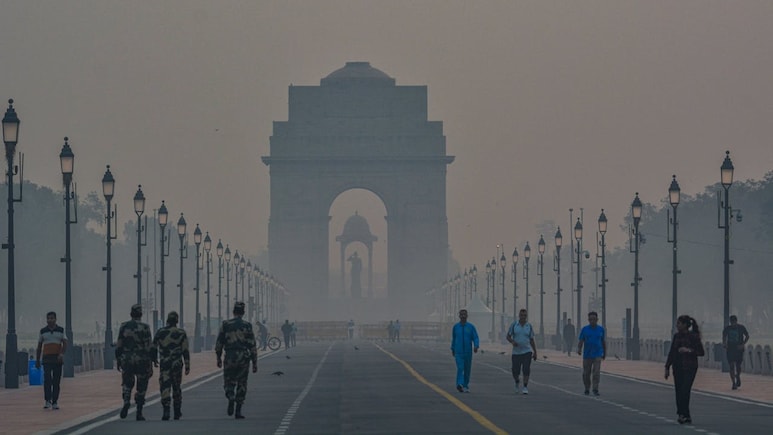
The air over Delhi-NCR has breached alarming thresholds on the day of Diwali 2025. Data from the Central Pollution Control Board (CPCB) show that the 24-hour average Air Quality Index (AQI) rose to 345, up from 326 the day before, and four monitoring stations have already recorded AQI values above 400, indications of the "severe" category. On Diwali evening alone, 34 out of 38 stations in the city registered air quality in the "red zone" (very poor to severe). Notably, locations such as Wazirpur reported 423, Ashok Vihar 404 and Dwarka 417. In such conditions, even routine activities like an early morning jog can turn into a silent health hazard, particularly for elderly residents and young children.
#WATCH | Visuals from the India Gate as GRAP-2 invoked in Delhi.
— ANI (@ANI) October 21, 2025
The Air Quality Index (AQI) around the India Gate was recorded at 342, in the 'Severe' category, in Delhi this morning as per the Central Pollution Control Board (CPCB). pic.twitter.com/ZUwDCWpdT8
Why Morning Exercise Is Risky in 'Severe' Air
"Severe" AQI (generally AQI less than or equal to 401) signals that air pollution has reached levels that can affect anyone, not just people with pre-existing conditions. Fine particulate matter (PM2.5) and respirable dust (PM10) dominate such scenarios. For older adults, whose lung capacity and immune systems may already be compromised, inhaling polluted air while exercising forces the lungs to work harder, increasing the risk of inflammation, asthma flare-ups, heart irregularities and even chronic respiratory conditions.
For children and adolescents, the combination of deep breathing during exercise and high pollution means more particulate matter penetrates deep into airways and bloodstream. This doesn't just cause coughs or throat irritation, it can hamper lung development and increase infection risks. Considering that Delhi stations are reporting more than 300 ug/m3 of PM2.5 in many areas, the danger is real.
Immediate Precautions For The Elderly And Kids
Given the severe conditions across Delhi-NCR today, the following health precautions must be taken on an immediate basis.
For seniors:
- Delay or move your walk/routine indoors until AQI drops to "moderate" or "poor" levels (usually AQI around 200-300).
- If you must step out, avoid peak pollution hours (morning rush and peak traffic contribute heavily) and wear an N95/FFP2 mask.
- Keep windows closed, use an air-purifier at home, and monitor symptoms like wheezing, chest tightness or fatigue.
- Reschedule strenuous routines for days when AQI improves or stick to indoor gentle movement (yoga, stretching).
For school-age children:
- Avoid outdoor physical education or sports when AQI is "very poor" or worse as children's growing lungs are more vulnerable.
- Encourage indoor play, ensure they wash faces/hands when coming in, and keep windows closed during heavy smog.
- Be alert for signs such as persistent coughs, breathlessness on minimal exertion or eye irritation, warranting a paediatric check-up.
What This Means For Residents In Delhi-NCR
When 34 of 38 stations hit "red zone" levels, and a few report "severe", city-wide caution is warranted. The region has also activated Stage II of the Graded Response Action Plan (GRAP), under which stricter pollution control measures kick in, signalling that the government anticipates continued deterioration. For the average resident, this means: indoor air quality changes from optional to essential. The choice to go out for an early morning jog, seemingly harmless, becomes a health hazard when air is so polluted. Waiting for the air to clear, moving activity indoors, or choosing low-impact exercise are safer options for now.
In Delhi-NCR's current smog scenario, a usual morning jog could do more harm than good, especially for older adults and children. When the AQI has climbed into the "severe" zone, the best move is to protect your lungs, postpone outdoor exertion, and create a safer indoor alternative. Your health isn't just about breaking a sweat, it's about breathing clean air too.
Disclaimer: This content including advice provides generic information only. It is in no way a substitute for a qualified medical opinion. Always consult a specialist or your own doctor for more information. NDTV does not claim responsibility for this information.
Track Latest News Live on NDTV.com and get news updates from India and around the world

